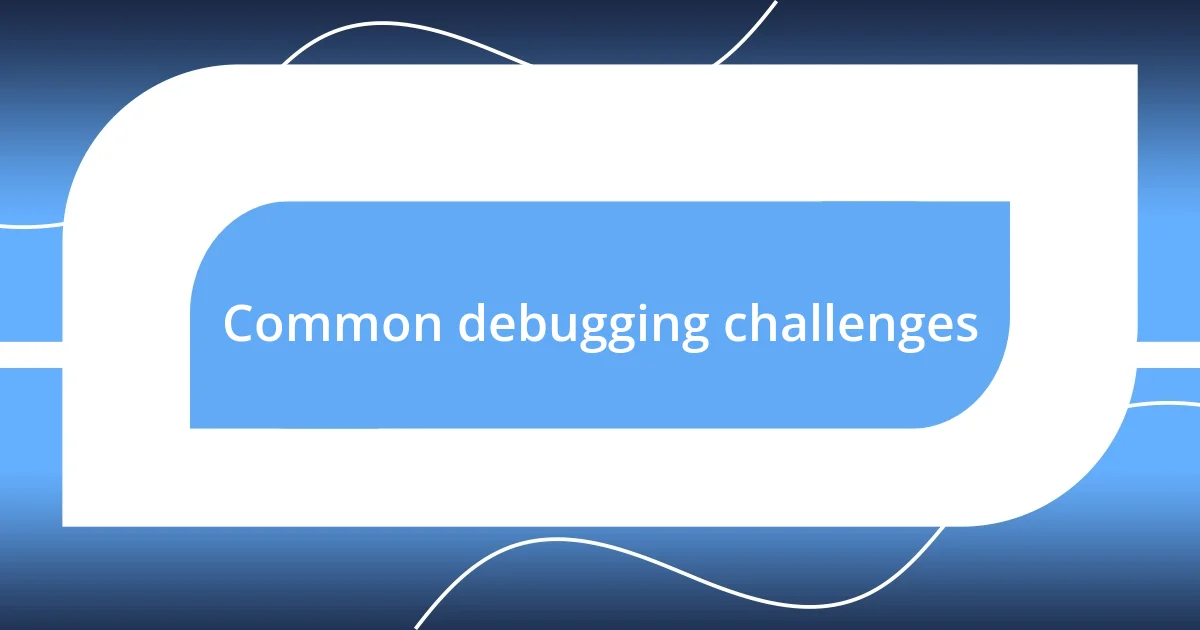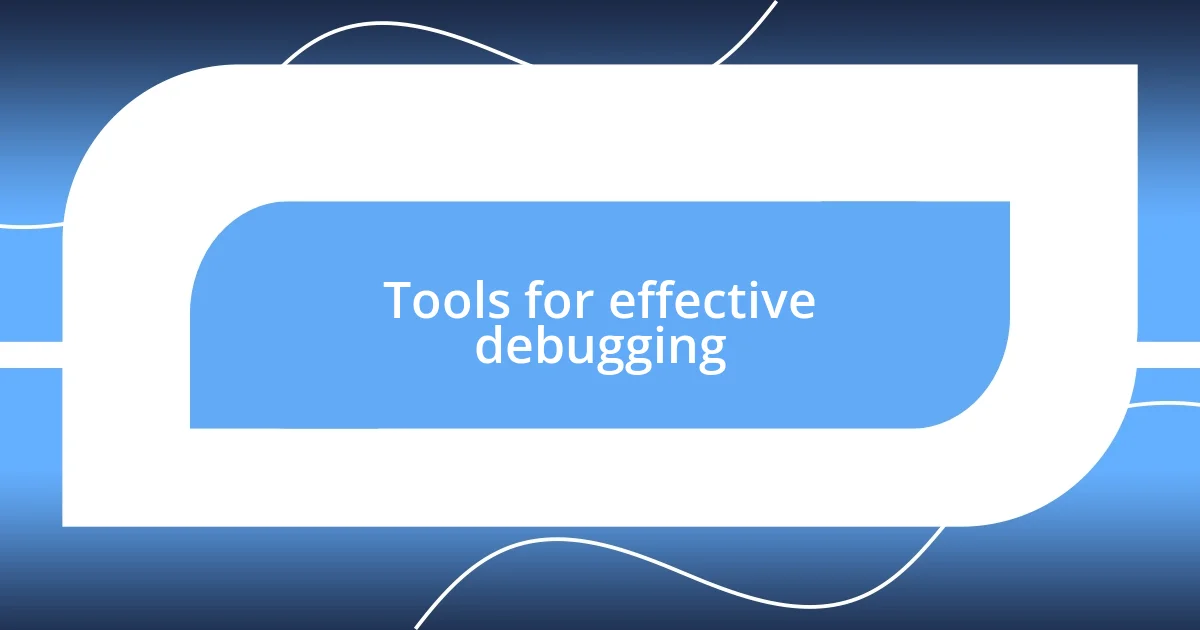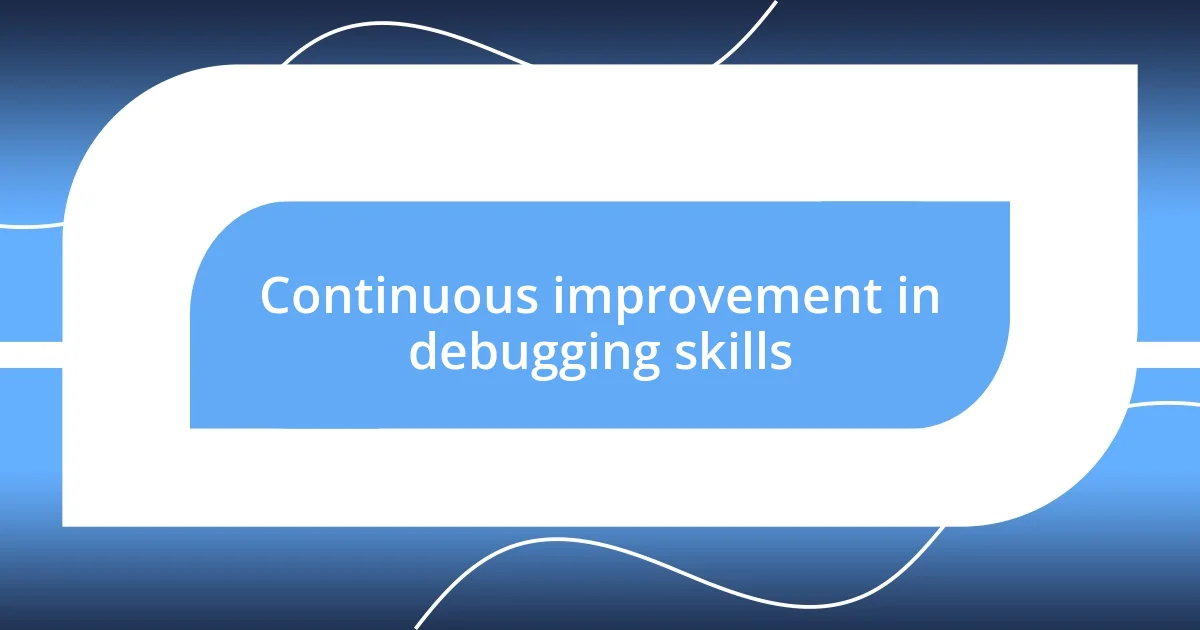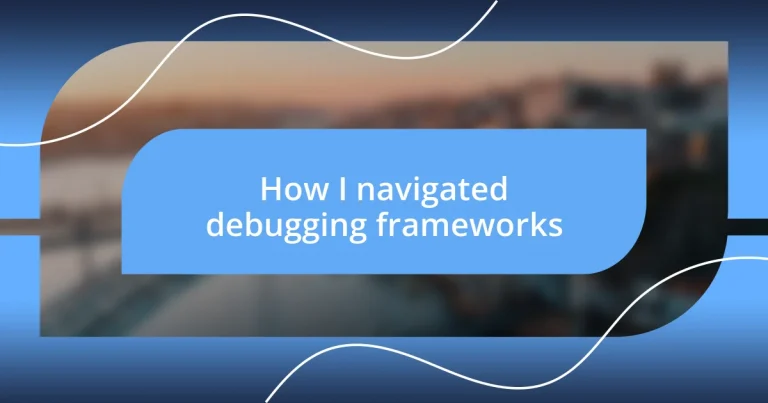Key takeaways:
- Debugging frameworks are essential for simplifying the process of identifying and resolving code issues, providing structured environments tailored to different programming languages.
- Common debugging challenges include unclear error messages, too many variables, environmental discrepancies, race conditions, and the emotional toll of mental fatigue.
- Effective debugging strategies involve breaking problems into smaller parts, maintaining documentation, taking breaks for mental clarity, and leveraging collaboration for fresh perspectives.

Understanding debugging frameworks
Debugging frameworks serve as essential tools for developers, guiding them through the intricate process of identifying and resolving issues in their code. I remember the first time I encountered one; it felt like being handed a map in a labyrinth. Suddenly, the muddled pathways of my code became clearer, allowing me to navigate more effectively.
These frameworks provide a structured environment that helps isolate problems, making it easier to pinpoint the roots of errors. Have you ever spent hours chasing down a bug only to find it was a simple oversight? That frustration is something I’ve faced numerous times, and the right debugging framework can transform that experience into a learning opportunity rather than a headache.
What I find particularly fascinating is how different frameworks cater to various programming languages and environments. For instance, when I switched from Java to Python, I was amazed by how frameworks like PyCharm offered integrated debugging tools that simplified tracking down issues. It made me realize that the right framework not only saves time but also enhances my overall coding experience.

Common debugging challenges
One common challenge I frequently encounter during debugging is dealing with unclear error messages. There’s nothing quite like the frustration of staring at a cryptic stack trace. I remember a particular instance when I received a message that said, “undefined method,” and my immediate response was to panic. If only these messages came with a user manual! Understanding the context behind these errors often takes time and a bit of research, making it easy to feel overwhelmed.
- Too Many Variables: When there are numerous variables and data flowing through your code, tracking which ones affect outcomes can be a nightmare.
- Environmental Issues: Differences between development and production environments can introduce bugs that are tough to replicate.
- Race Conditions: Bugs that result from the timing of events can be elusive and challenging to debug without proper logging.
- Third-Party Libraries: Relying on libraries outside your control often leads to unexpected behavior, and pinning down the source of the issue becomes a guessing game.
- Emotional Toll: The mental fatigue from repeatedly trying to solve the same issue can lead to burnout, which is when I’ve learned to take a step back and breathe.

Tools for effective debugging
When it comes to effective debugging, the right tools can make a significant difference. From my experience, integrated development environments (IDEs) like Visual Studio Code and JetBrains have robust debugging features. For me, exploring the step-by-step execution of my code through these tools transformed how I approached problems. It’s like having a trusted co-pilot pointing out where things might be going off course.
I’ve also found that using browser developer tools is invaluable, especially when dealing with web applications. The ability to inspect elements and view real-time console logs can often lead to those “aha” moments. I remember tracking down an issue with a broken feature; a quick look at the network activity revealed that my API calls were failing — and just like that, the solution became clear.
While many tools offer great functionalities, I believe the true power lies in knowing when to use them. Sometimes, I revert to simple logging for less complex applications. It’s surprising how effective basic console logs can be in uncovering issues without the overhead of complex tools. Ultimately, the best debugging strategy combines these tools wisely to fit the specific context of the problem at hand.
| Tool | Best Use Case |
|---|---|
| Visual Studio Code | General debugging with intuitive interface |
| JetBrains IDEs | Advanced debugging features for various languages |
| Browser Developer Tools | Debugging web applications in real-time |
| Console Logging | Quick checks for straightforward issues |

Strategies for debugging success
When debugging, one of my go-to strategies is to break the problem down into smaller, manageable parts. I remember tackling a particularly complex issue in a project once. It was overwhelming, but by isolating each function and verifying its output step-by-step, I gradually pinpointed where things were going awry. Suddenly, it felt less like climbing a mountain and more like completing a series of small, achievable tasks. Have you ever tried this method? It can really change how you perceive a seemingly insurmountable problem.
Another effective approach is to maintain clear and concise documentation throughout the development process. In my experience, revisiting my notes can be a lifesaver when a bug emerges. I once found myself stuck on a piece of code for hours, only to discover that I had overlooked a simple comment I wrote weeks prior about a potential pitfall. It’s like having a backup plan that didn’t involve starting from scratch. How often do you engage in documentation? I can’t stress enough how valuable it is.
Moreover, I’ve learned that taking breaks is crucial during the debugging process. When I get too entrenched in the details, my mind tends to race, often leading to a mental block. After stepping away for a quick walk or even just grabbing a cup of coffee, I return with fresh eyes and perspective. Sometimes, all it takes is a moment to let the brain reset. How do you usually recharge when facing a stubborn bug? Finding your rhythm in this part of the process can really enhance your productivity in the long run.

Best practices for debugging frameworks
It’s no secret that organization plays a pivotal role in effective debugging. I can’t tell you how many times I’ve found myself tangled in a web of confusion, trying to remember the last change I made. Keeping a structured approach, like cultivating a clean workspace and organizing my files logically, has saved me countless hours. It’s amazing how clear pathways can lead to clearer thinking, don’t you agree?
I often advocate for using version control systems, like Git, when navigating the complexities of debugging. There was this one time when a significant bug resurfaced after I had made multiple changes. Thankfully, I could revert to a previous state of my code with just a few clicks. It’s like having a safety net; do you ever wish you could hit ‘undo’ on problematic decisions in life, too? This tool not only documents my work but gives me peace of mind as I explore solutions.
Lastly, I’ve learned the value of discussing challenging bugs with peers. There’s something rejuvenating about bouncing ideas off someone else. In one instance, I was struggling to identify a bug that seemed impervious to my efforts. A colleague and I sat down together, and during our conversation, they pointed out a detail I had completely overlooked. It’s like having an extra pair of eyes can illuminate paths you didn’t even know existed. Do you often collaborate with others when facing tough challenges? Sometimes, a collaborative mindset can unveil solutions that spark innovation.

Case studies in debugging
When I reflect on debugging, a specific instance comes to mind where I was grappling with a nested loop issue that was causing performance hiccups. I spent an entire afternoon wrestling with it, feeling frustrated as each attempt ended in the same dead end. It wasn’t until I stepped back and diagrammed the logic flow that the lightbulb moment hit—visualizing the data structures helped me uncover a misplaced condition. Have you ever had a breakthrough like that? Sometimes, just changing your perspective can turn chaos into clarity.
I also recall a time when I was working on a mobile application that wouldn’t load properly. I had diligently checked all my code but was still at a loss. In a moment of frustration, I decided to explore the logs to uncover hidden messages. Those logs revealed an unnoticed network request failure—like finding a needle in a haystack. It was a reminder that the smallest details can reveal the biggest obstacles. How often do we overlook logs in our quest to solve issues?
One of my most enlightening experiences involved collaborating with a mentor during a particularly perplexing debugging session. I had been stuck on a critical bug that caused a crash under specific conditions. We sat together, and as I explained my thought process, she encouraged me to think aloud. Sometimes, verbalizing the problem can unravel confusion in unexpected ways. That session left me not only with a solution but also a newfound appreciation for the power of dialogue. Have you ever benefited from talking through your challenges?

Continuous improvement in debugging skills
I truly believe that continuous improvement in debugging skills is a journey fueled by curiosity. There was a period when I realized that I was tackling the same types of bugs repeatedly. It hit me that maybe I was approaching debugging with a one-size-fits-all mindset. So, I took a step back and decided to study different debugging methodologies. This effort led me to uncover techniques that have genuinely transformed my approach, and it reminds me that there’s always room to grow, isn’t there?
One of the most rewarding aspects of honing my debugging skills has been embracing failure as a teacher. I vividly remember facing a frustrating issue that seemed unsolvable, and I spent hours chasing my tail. But instead of feeling defeated, I began to document not just the solutions but also the mistakes I made along the way. Reflecting on those missteps turned out to be an enlightening exercise, as I could spot patterns of error and evolve my strategies. Have you ever found valuable lessons hidden in your mistakes?
Furthermore, I’ve come to appreciate the role of community in my continual growth. Engaging with online forums and developer meetups has introduced me to new tools and perspectives that I never would have considered. I distinctly recall a time when a chance conversation at a meetup sparked a revelation about a tool designed to automate debugging processes. That serendipitous moment was a reminder that collaboration and connection can ignite innovation. Do you take advantage of networking opportunities to bolster your own skills? There’s so much wisdom out there waiting to enrich our understanding.














